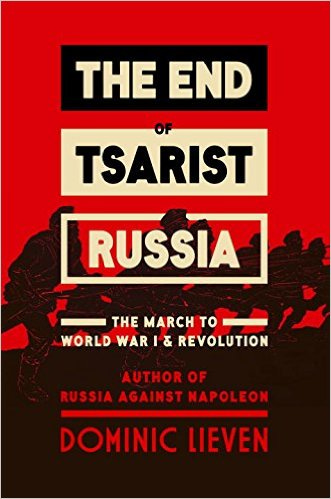Dying of Humiliation

Lieven’s The End of Tsarist Russia subtly proposes a novel theory of Russia’s disastrous entry into World War I: Millions died to spare Russia’s elites from feelings of humiliation.
First, Lieven sets the stage:
Revolution at home had undermined the Russian war effort against Japan in 1905 and forced the government to sign a humiliating peace.
And:
Europeans operating outside their continent might be rivals, but they shared a strong sense of racial and cultural superiority over natives they were suppressing. But the Slavs living on what Vienna perceived as its semicolonial periphery had a great-power Slav protector in Russia, which often identified with them in cultural terms, and was likely to see their humiliation as its own.
As war approached:
The Russian press coined the unhelpful phrase “diplomatic Tsushima” to describe Russia’s surrender to German and Austrian pressure at the climax of the Bosnian crisis. The phrase was an exaggeration, but it reflected the mood of Russian public opinion and its acute sensitivity to further defeat and humiliation. This was the most important legacy of the Bosnian crisis… At the very outset of the crisis, the Russian foreign minister, Serge Sazonov, stressed to the German ambassador in Petersburg, Count Pourtales, that Russia sought peace and was very open to compromise, but the one thing it would never again tolerate was being faced with ultimatums or having its back forced to the wall as in 1909. Both Pourtales and the Austrian ambassador, Count Douglas Thurn, believed Sazonov and made this reality very clear to their governments. Thurn repeated on numerous occasions during the Balkan crisis that although the Russia leadership sought and badly needed peace, it would accept even a nearly hopeless war rather than face further humiliation: “The defeat of 1909 has left far too deep a legacy here for any Russian government, however peacefully disposed, to be able to survive any repetition of this event.” Nothing had changed by July 1914, when Russia faced the choice between war and surrender to an even more peremptory and humiliating Austro-German challenge.
Nicholas de Basily, deputy head of Russia’s foreign ministry, is particularly explicit:
To back down in the face of this challenge [the July 1914 crisis] would, he wrote, have been “cowardice” and “a humiliation.” The Austrian military attache Prince Franz Hohenlohe was a personal friend. Shortly after the assassination of the Austrian heir, Hohenlohe said to Basily that fear of revolution must surely dictate to Russia’s rulers the avoidance of war. Basily answered that “you commit a serious error of calculation in supposing [that] the fear of revolution will prevent Russia from fulfilling its national duty.”
All this raises to a broader question: Was dread of national humiliation limited to Russia? If not – and it’s hard to believe it was – then Lieven inadvertently suggests a novel theory of World War I itself. Namely: It was fought for leaders’ emotions, not nations’ interests. Any of the major participants could
have unilaterally saved their countries – and Europe itself – by swallowing their pride. But none were willing to efface their egos to spare millions of lives.
The post appeared first on Econlib.

